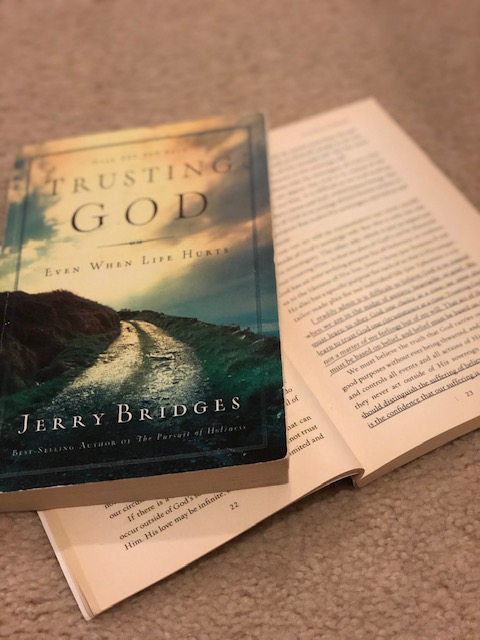“Trust is not a passive state of mind. It is a vigorous act of the soul by which we choose to lay hold on the promises of God and cling to them despite the adversity that at times seeks to overwhelms us.” ― Jerry Bridges, Trusting God: Even When Life Hurts
The struggle in my heart has been real and ongoing. I wake up every day with the choice before me. Will I trust God today or not? The question demands my attention as it hovers mostly at the edge of my mind, sometimes dead center.
The future, the list, the loneliness, the finances, the call, the decisions, the emotions, the fear – it all just looms.
There are reasons why some of us struggle more than others with trust.
Personality. Past abuse. Trauma.
And then, there’s always our sin nature. There’s that.
So, I grab my Bible and continue my journey of what I have now dubbed “The Trust Project.”
- I have read Trusting God (Jerry Bridges, NavPress) at least three times, completed the workbook, underlined and meditated on every verse given.
- I have gone through the life of Christ to learn from His example. Talk about trusting God – now there’s an example.
- I have opened each book and chapter of the Bible explicitly looking for the character of God.
This deliberate study, meditation, and application of God’s Word is strengthening my trust in God.
And now, I am here.
It was supposed to be a fresh round of reading through the Bible; it is now another phase in my “trust project.” Chapter by chapter, I make my way through. Some sections demand more than one day of reading; all demand prayerful thought and study for an incomplete statement sits in my journal waiting to be finished.

“I can trust God because…”
I have heard it said that the Bible testifies to the trustworthiness of my God on every page, and I believe it does, but I want to prove it. How about you, my friend? How badly do you want to trust God?
In every situation?
How desperate are you to stop the anxiety that plagues you?
Maybe this trust project will help you, too. It’s simple.
- Open your Bible to the book of Genesis. Focusing on just this book will keep you within the entire narrative, anchor your heart, and help eliminate the temptation to lift things out of the text.
- Take one chapter at a time but, when possible, read the chapters preceding and after your focus chapter. These chapters are essential for gaining and keeping context. Seeing God in the entire story and then the complete narrative of scripture helps us see Him in our own story and, finally, in redemption’s story.
*In the example below, you will see that if I hadn’t already carefully read the prediction concerning Ishmael in Genesis 16, I probably wouldn’t have seen the amazing trustworthiness of God in Genesis 25.
- In 4 – 5 sentences, write out a chapter summary for the current focus chapter.
- Read the focus chapter as many times as it takes and for as many days as it takes to let its truths sink into your heart. Without any other resources, meditate on what has been said. Let the Word of God speak to you first. Remember, the “Word of God is quick and powerful and sharper than any twoedged sword…” (Hebrews 4:12).
- When ready, complete this sentence, “I can trust God because…”
- Try not to grab the obvious all of the time, such as, “I can trust God because He knows what He is doing.” Yes, that is true. But what in the chapter was God specifically doing? Was He preparing someone for a greater truth, another challenge? Was someone suffering? Was there a genealogy? Sometimes the apparent truth is the best truth and precisely what we need, but often there is more there that God wants to show us. Don’t be too quick to grab the easy. Let yourself think.
- Now that you have finished the trust sentence, look for your core belief concerning God that sits underneath. You see, we are driven by what we believe. We may say we believe God, but our lives will preach what we really believe. Eventually, you will see the core beliefs that resonate with you and the ones you need to strengthen (see the last page for a list of attributes/core beliefs).
*Example
Chapter: Genesis 25
Context: Genesis 24 – Isaac gets Rebekah for a wife; Genesis 26 – Isaac becomes patriarch, after Abrahams’ death.
Chapter summary: Abraham, the widower, takes Keturah for his wife and then he dies and is buried where Sarah is buried (the only piece of real estate he owned in what would one day become the “Promised Land”); the descendants of Ishmael are listed; Jacob and Esau are born and the favoritism and rivalry begins
I can trust God because His trustworthiness is based on His character, not mine or anybody else’s. Gen. 16:12 – Ishmael’s contrary character predicted; 17:20 – God’s promise to Abraham to bless Ishmael; 25:12 – 18 – God’s promise fulfilled.
Core belief: God keeps His Word, Joshua 23:14; Jeremiah 1:12; Lamentations 2:17; Philippians 1:6/ God cannot lie. Numbers 23:19; Malachi 3:6; Hebrews 6:18
See the attached PDFs for a template and a copy of “This is my God” (Core beliefs about God). Feel free to copy both.
I pray this simple “Trust Project” leads you to a deeper trust in your heavenly Father.





I am so grateful for all the encouraging things that you share on this blog! Thank you!
I am so glad to be able to share them, Holly.